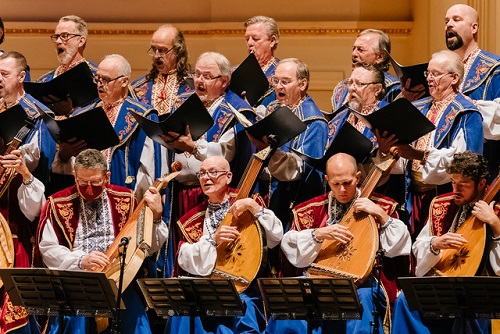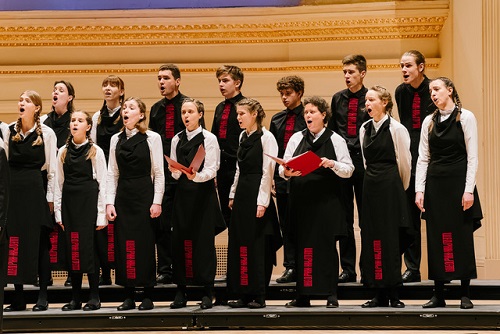 United States Various, Notes from Ukraine – 100 Years of ‘Carol of the Bells’: Marichka Marczyk (vocalist), Janai Brugger (soprano), Ukrainian Children’s Choir ‘Shchedryk’ / Marianna Sablina (conductor), Ukrainian Bandurist Chorus / Oleh Mahlay (conductor), Ukrainian Chorus Dumka of New York / Vasly Hrechynsky (conductor), Choir of Trinity Wall Street / Daniela Candillari (conductor). Carnegie Hall, New York, 4.12.2022. (RP)
United States Various, Notes from Ukraine – 100 Years of ‘Carol of the Bells’: Marichka Marczyk (vocalist), Janai Brugger (soprano), Ukrainian Children’s Choir ‘Shchedryk’ / Marianna Sablina (conductor), Ukrainian Bandurist Chorus / Oleh Mahlay (conductor), Ukrainian Chorus Dumka of New York / Vasly Hrechynsky (conductor), Choir of Trinity Wall Street / Daniela Candillari (conductor). Carnegie Hall, New York, 4.12.2022. (RP)

On 5 October 1922, the Ukrainian Christmas carol ‘Shchedryk’ rang out in Carnegie Hall. It was the first time that an American audience had heard the song by Mykola Leontovych, which would become known the world over as ‘Carol of the Bells’. Just over a century later, on 4 December 2022, the carol again resounded in the hall. Now, as then, Ukraine is engaged in a battle to maintain its unique cultural identity and sovereignty distinct from that of Russia.
In 1922, ‘Shchedryk’ was sung by the Ukrainian Republic Capella, the national choir of the Ukrainian National Republic, which existed between 1917 and 1920. From 1922 until 1991, the Ukrainian Soviet Socialist Republic was one of the constituent republics of the Soviet Union. In 1991, 92.3% of Ukrainian voters approved a declaration of independence, and the country became officially known as Ukraine.
At Notes from Ukraine – 100 Years of ‘Carol of the Bells’, ‘Shchedryk’ was sung in the arrangement by Peter J. Wilhousky that has made it universally popular. (Wilhousky was a choral director and music administrator in the New York public schools for 25 years.) The combined voices of the Ukrainian Children’s Choir ‘Shchedryk’, the Ukrainian Bandurist Chorus and Ukrainian Chorus Dumka of New York united on stage to perform it. When it was reprised as an encore, the Choir of Trinity Wall Street sang too. Needless to say, they didn’t need the music.

The concert opened with music from Ukraine’s past. Canadian-American folk vocalist Marichka Marczyk entered the hall singing ‘Oh, how it was long ago’ from the Pokuttia Region, which is in the southeast of modern-day Ukraine. She was then joined by the Ukrainian Bandurist Chorus and Ukrainian Chorus Dumka of New York in singing the earliest extant Ukrainian Christmas carol, ‘The Magi of Persia’.
The two choirs next sang Christmas music that is heard in modern-day Ukraine. Among the most poignant offerings was ‘The King’s Crown’ by Hanna Havrylets, sung by the Ukrainian Chorus Dumka. Its sensitive rendering was a tribute to the composer, who died on 27 February 2022, the third day of Russian’s invasion of Ukraine. Havrylets, who worked in many genres including symphonic, instrumental, chamber and choral works, suffered an aneurysm and was unable to get medical help due to the conflict.
The most exotic sound to be heard in the concert was that of the bandura, considered to be the national instrument of Ukraine. Historically, it was associated with blind traveling minstrels who went from village to village singing epic ballads and historical songs. It produces a delicate, tinkling sound that combines those of the lute and the harpsichord.
The all-male Ukrainian Bandurist Chorus is a North American choral and instrumental ensemble dedicated to preserving the Ukrainian musical tradition and the art of the bandura. The consort of bandurists play the Kharkiv version of the plucked string folk instrument. With 34 to 65 strings and often a key-changing mechanism, the Kharkiv bandura is little heard nowadays in Ukraine.
The combination of the full-bodied singing of the chorus and the shimmering sound of the bandura was heard throughout the concert, but resonated most beautifully in two carols by Mykola Lysenko, ‘I Am Caroling’ and ‘Oh Carol’. Active during the late-nineteenth and early-twentieth centuries, the Ukrainian composer, pianist, conductor and ethnomusicologist was a pivotal figure in establishing his country’s national music tradition.
The Ukraine of today was represented by 56 members of the Ukrainian Children’s Choir ‘Shchedryk’, made up of 51 girls and five boys, aged 11 to 15. With their conductor, Marianna Sablina, they traveled from Kiev to New York to perform. Over the past months, all have experienced war firsthand, sharing in their country’s defeats and triumphs as well as suffering personal losses. To the extent that these experiences were reflected in their singing, it was only in a deeper connection with the music. The brave young choristers sang with clear tone, perfect intonation, poise and an exuberance befitting their youth.
As with the other choruses, the children sang music by contemporary Ukrainian composers: ‘Alleluia’ from Valentyn Sylvestrov’s Three Sacred Songs, the ‘Gloria’ from Victoria Poleva’s Missa-simphonia and Havrylets’ ‘Stepping Wheel’. Their performance of ‘Somewhere in my Memory’ from John William’s soundtrack for Home Alone, however, tugged at one’s heartstrings: the joys of Christmases past of which they sang will be more precious memories for them than ever.
The second half of the concert featured the Choir of Trinity Wall Street, one of New York’s finest professional vocal ensembles, and the offerings included works reflecting the cross-cultural currents that exist between Ukraine and the U.S. The first piece, however, was a traditional Ukrainian lullaby, ‘A Dream Passes by the Window’, arranged by Sarah Martinez. Along with ‘Shchedryk’, it was performed at the historic concert in 1922.
The Trinity Wall Street forces brought sly humor to selections from The Noel Consort by Kiev-based composer Svyatoslav Lunyov. In his arrangements of traditional carols such as ‘Silent Night’ and ‘God Rest Ye Merry Gentlefolk’, Lunyov twists a melody or introduces a harmony that imparts a dreamlike sensibility. The jolt that comes from the unexpected is something that Lunyov exploited to the full.
The final work was the world premiere of Trevor Weston’s ‘Slowly’, a setting of selections of a text by Serhiy Zhadan. The Ukrainian poet has remained in his country, mostly in Kharkiv, throughout the war. In ‘Slowly’, he captures the devastation of the war with vivid images of the carnage and bitter emotion.
The Choir of Trinity Wall Street understands Weston’s style, having performed and recorded his music. The singers etched in tones and phrasings that captured Weston’s subtle harmonic shifts and mood changes in his setting of Zhadan’s words, as did the soloist, soprano Janai Brugger. (She had earlier sung an achingly beautiful ‘Summertime’ by George Gershwin.) ‘Slowly’ is a profound work that captures both the futility of war and the complex emotions of one who has endured it.
In pre-recorded videos, Ukrainian President Volodymyr Zelenskyy and First Lady Olena Zelenska spoke of the devastation resulting from the Russian invasion, the need for assistance to rebuild their country and their gratitude for the support Ukraine has received from the American people. Proceeds from Notes from Ukraine will go to Rebuild Ukraine, which provides vital humanitarian aid to Ukraine’s defenders, civilians and refugees.
As it was a century ago, music is once again a rallying cry in support of Ukraine. Decades of Soviet domination didn’t destroy the country or its culture. At Carnegie Hall, it was once again a simple carol that exemplified that most beautifully and poignantly.
Rick Perdian
For more information on ‘Rebuild Ukraine’ click here.